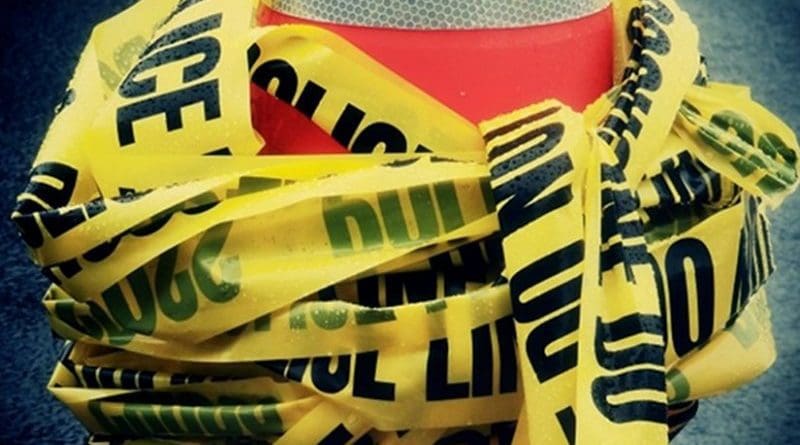California’s Golden Opportunities For Criminals – OpEd
In late November, mobs of armed robbers began to ransack California retail stores, with one attack claiming the life of Oakland security guard Kevin Nishita. The former San Jose police officer, father of two and grandfather of three, was shot by one of the robbers while protecting a television news crew and later died in the hospital. Nishita’s murder did not prompt an immediate statement from Governor Gavin Newsom, although he did address the recent crime spree.
“The level of organized retail theft we are seeing is simply unacceptable,” Newsom said in a statement last week. The governor mentioned “crime” but did not call for anyone to be “brought to justice.” In his remarks, Newsom said, “We want real accountability. We want people prosecuted and we want people to feel safe this holiday season.” As the governor contended, the “majors have to step up,” and “address retail theft rings and other quality of life issues.”
For “issues” such as murder and robbery, California is the ideal venue.
Gavin Newsom touted Proposition 47, the 2014 ballot measure that reduced certain thefts from felonies to misdemeanors and empowered criminals to steal $950 worth of goods with impunity. The measure launched a spree of smash-and-grab attacks. In San Francisco on average, one vehicle break-in was reported every 20 minutes, with nearly 30,000 in one year. Police made arrests in fewer than two percent of those cases. Adult criminals took full advantage and juvenile criminals got additional special protection from California’s Proposition 57.
That 2016 measure bars prosecutors from directly filing juvenile cases in adult court, regardless of the gravity of the crime. As Katy Grimes of the California Globe notes, crimes considered “nonviolent” under Prop. 57 include human trafficking, rape of an unconscious person, assault on a police officer, serial arson, exploding a bomb with intent to injure, solicitation to commit murder, assault by a caregiver on a child, and felony domestic violence. State Democrats rejected bills that would have addressed the problems of Prop. 57, hardly alone among recent measures to protect criminals.
Under Senate Bill 1391, signed by former Governor Jerry Brown in 2018, criminals under the age of 16 may only be tried in juvenile court, regardless of the crime. Under this law, a juvenile could murder any number of people, serve time in a soft juvenile detention facility, and be released on his or her 25th birthday, effectively a 10-year maximum for murder. The murderer of Kevin Nishita has yet to be identified but Newsom’s silence is telling, particularly in light of another back story.
On Friday, November 19, a Wisconsin jury found Kyle Rittenhouse not guilty of all charges. Two days later in Waukesha, a man named Darrell Brooks, with a long criminal record, drove an SUV into a Christmas parade, according to witnesses, driving in a zig-zag pattern to hit as many people as possible. The attack claimed six lives (so far), including eight-year-old Jackson Sparks, who died in the hospital.
In her first public statement on the attack, Kamala Harris, lamented “the tragedy that occurred last night in Wisconsin.” The former attorney general of California mentioned not a single victim of the “tragedy,” nor the name of the suspect. In Milwaukee, Black Lives Matter militant Vaun Mayes said “it sounds possible that the revolution has started in Wisconsin. It started with this Christmas parade.”
The “revolution” continued in California with mob robberies and the murder of Nishita. California politicians failed to condemn the killing even as an example of “gun violence.” Nishita is Asian, but politicians did not raise the possibility of racism or “Asian hate.” Cries did not ring out for the murderer to be tracked down and brought to justice.
Gavin Newsom is a crony of Jerry Brown, who also put the concerns of criminals above those of their victims. Brown’s choice for chief justice of the California state supreme court in 1977 was Rose Bird, who overturned every death penalty case before voters turned her out in 1986. In 2018, Brown claimed the concerns of crime victims “weighed on me” but signed SB 1391 as a move toward “a more just system.”
Last year, when Newsom declared the state of emergency, he hailed the leadership of House Speaker Nancy Pelosi (D-Calif.), once his aunt by marriage. California Democrats in 2020 were notably silent during the nationwide rioting that claimed 25 lives, including that of retired African American police officer David Dorn, gunned down while protecting a friend’s business.
For Newsom, the violent crime spree is “unacceptable,” language Californians might expect for a student who brought home a “C” instead of a “B.” The governor calls for “accountability,” language Californians would expect for a wasteful bureaucrat, not violent criminals who gun down security guards as they protect a news crew.
With Black Lives Matter militants claiming that a mass murder at a Christmas parade marks the start of a revolution, more death and destruction cannot be long delayed. That is particularly the case in a state where criminals enjoy strong legal incentives. No justice, no peace.
This article was also published in American Greatness

